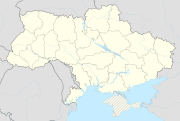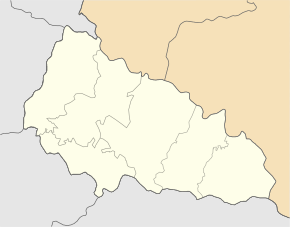Velykyi Bychkiv
| Velykyi Bychkiv | ||
| Великий Бичків | ||

|
|
|
| Basic data | ||
|---|---|---|
| Oblast : | Zakarpattia Oblast | |
| Rajon : | Rakhiv Raion | |
| Height : | 307 m | |
| Area : | 52.35 km² | |
| Residents : | 9,423 (December 2004) | |
| Population density : | 180 inhabitants per km² | |
| Postcodes : | 90615 | |
| Area code : | +380 3131 | |
| Geographic location : | 47 ° 58 ' N , 24 ° 1' E | |
| KOATUU : | 2123655500 | |
| Administrative structure : | 1 urban-type settlement | |
| Mayor : | Odarka Selenko | |
| Address: | вул. Грушевського 108 90615 смт. Великий Бичків |
|
| Website : | http://www.bychkiv.com.ua/ | |
| Statistical information | ||
|
|
||
Velykyi Bychkiv (Ukrainian Великий Бичків ; Russian Великий Бычков / Veliky Bychkov , German rare large-Botschko , Czech Veliký Bočkov , Slovak Veľký Bočkov, Bočková , Hungarian Nagybocskó , Romanian Bocicoiu Mare ) is an urban-type settlement in the Western Ukraine ( Zakarpattia Oblast , Rakhiv Raion ) about 36 kilometers east of the city of Tyachiv .
The place with about 9400 inhabitants is located in the valley of the Tisza at the confluence with the river Schopurka (Шопурка).
history
The place was mentioned in writing for the first time in 1358 as Buchku and is derived from the Slavic word for "bull". In 1556 it came under the rule of the Báthorys , and in 1711 there was already a stately seat in the village. After the failed uprising under Franz II Rákóczi and the resulting expulsions and refugee movements, Germans settled in the area around the village. In the course of time, three distinguishable settlements emerged: Nagybocskó and Kisbocskó ("large" and "small" Botschko), which make up today's Welykyj Bytschkiw, and Németbocskó ("German Botschko"), which lies on the southern side of the river in Romanian territory and there it is called Bocicoiu Mare . In 1910, the place belonging to the Kingdom of Hungary in Máramaros County had 5,955 inhabitants, of which 3,078 were Ruthenians , 1,646 Hungarians and 1,177 Germans. After the end of the First World War it came to the newly formed Czechoslovakia (as part of the Carpathian Ukraine ) and was ceded to the USSR after the end of the Second World War . On May 30, 1947, the place received the status of an urban-type settlement .
There is a chemical factory, a sulfuric acid factory and a salt refinery in the village. Between 1970 and 1998 there was also a railway connection to the Tereswa – Velykyj Bytschkiw railway line and a forest railway, built in 1930, which led north and supported the forestry that was formerly also located in the village.
Personalities
- Theodore Romscha (1911–1947), Bishop and Apostolic Administrator
- Ivan Yaremchuk (born 1962), football player
Web links
- History of the place (Ukrainian)
- Information about the place (Hungarian)


